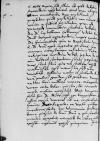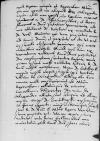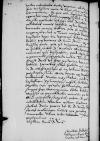Rediit ⌊Baptista⌋, cum in procinctu iam esset ⌊reverendissimus dominus⌋. Quoniam vero expediebatur tum nuntius ⌊Gedanensium⌋, qui litteras ab eis attulerat, quibus et gratulati sunt episcopatum Plocensem, et de discessu
serenissimae
⌊maiestatis regiae⌋ certiores fieri postulabant, quod id sua discerent interesse mature cognoscere, de eo, ut Reverendissimae Dominationi Vestrae scriberet, ⌊reverendissimum dominum⌋ admonui. ⌊Qui⌋ quoniam profecturus iam erat venatum cum serenissima
⌊maiestate regia⌋, dedit mihi negotium, ut in meis ipse litteris responderem ad nonnulla, quae scripsit Reverendissima Dominatio Vestra. Nam quod ea suspicari videtur ex domino ⌊palatino Brestensi⌋ prodiisse, quae ⌊reverendissimus dominus⌋ manu sua ⌊⌋ Reverendissimae Dominationi Vestrae, negat se ex eo audivisse, sed ipsam serenissimam
⌊maiestatem regiam⌋ dixisse, suadere quosdam, ut ne rogaret, sed mandaret. Qui autem sint ii, certum non habet ⌊reverendissimus dominus⌋ ac rogat, ut Reverendissima Dominatio Vestra eo animo velit esse erga dominum ⌊palatinum⌋, nulla ut existere queat dissidii causa. Quam vero ad rem cumprimis propensam esse scit Reverendissimam Dominationem Vestram, ad eam ut alios quoque cohortetur petit, eisque persuadere conetur, ne nihil in gratiam serenissimae
⌊maiestatis regiae⌋, sed solum id, quod debetur, faciendum existiment. Sunt enim aliqua etiam concedenda regi postulanti, si praesertim, quod postulatur, non minus ad eorum, a quibus postulatur, quam ad principis commodum spectare videtur. De domino ⌊castellano Gedanensi⌋ videtur ⌊reverendissimo domino⌋ tempus expectandum magis opportunu[m]. De humanitate, qua in Baptistam usa e[st] Reverendissima Dominatio Vestra, agit ingentes gratias, per omnem occasionem relaturus. Telae reliquias nondum vidit, postea de iis, cum viderit, sententiam suam perscribet.
Haec sunt fere, quae me scribere iussit; maluisset ⌊ipse⌋ manu sua, sed non vacabat. Officium meum in scribendo Reverendissimae Dominationi Vestrae probari gaudeo, sed gratiam tamen re tam levi nullam mereor.
⌊Alexandri⌋ vicem certe doleo, qui suo sibi iumento miser malum accersivit. Quo tempore fuit hic dominus ⌊Niderhoff⌋, ego languebam a[c] officii causa venerat ad me, conferebat n[on] pauca, de ⌊Alexandro⌋ ne verbo quidem mentione facta. Ego, ut primum prodire c[oepi] domo, quaesivi de ⌊reverendissimo domino⌋, a quo semel e[rat] prandio exceptus, numquid de ⌊Alexandr[o]⌋ egisset. Negavit egisse quicquam. Fuit i[s] apud ⌊regiam quoque et reginalem maiestatem⌋. Quacum egeritne aliquid de ⌊Alexandro⌋, nescio; alibi non egisse scio.
Centum marcas Prutenas a dominis Thuronensibus et decem florenos a domino ⌊palatino Pomeraniae⌋ ad me attulerat dominus ⌊Holstein⌋ ex mandato Reverendissimae Dominationis Vestrae. Quicum ego una profectus eram ad ⌊reverendissinum dominum⌋, et praesente eo, ita ut erat in sacculo obsignata, pecuniam ipse meis manibus reddidi, quod ipse, cum ex venatione redierit, reverendissimus dominus perscribet.
De confirmatione sententiae regiae, antequam essent mihi redditae litterae Reverendissimae Dominationis Vestrae, nihil acceperam, nam dominus ⌊Gatckowski⌋ neque misit, neque scripsit ipse verbum ullum de ⌊Alexandro⌋. Sed ex illo loco omnia mitti consueverunt ad ⌊maiestatem reginalem⌋ celaturque de cunctis cancellaria diligenter, ita, num de ⌊Alexandro⌋ allata sint aliqua ad illam, nescio. Scripsi domino ⌊Gantckowski⌋, responsum in horas exspecto, cuiusmodicunque fuerit, sciet Reverendissima Dominatio Vestra.
Serenissima ⌊maiestas regia⌋
venatum sana profecta est, utinam aeque sana redeat. Ante duas hebdomadas non revertetur, sed ⌊reverendissimus dominus⌋, spero, citius.
Pridie nativitatis Beatae Virginis allata sun[t] huc tristissima nova de turpi fuga militu[m] Germanorum. De qua cum coepissent duce[s] exercitus consilium, oppressi sunt a ⌊Turc[is]⌋. Ita solo equitatu dilapso cum ducibus, peditatus omnis deletus, castra direpta, tormenta omnia bellica, quae et multa, e[t] magna fuerunt, a ⌊Turcis⌋ occupata dicuntu[r]. Hesterno vero die venerunt litterae octo diebus posteriores ad ⌊reverendissimum dominum⌋ ex ea Russiae parte, quae est ⌊Hungariae⌋ finitima. In quibus scribit dominus ⌊Nicolaus Matziieows[ki]⌋, rumorem esse dissipatum, quod caesa sin[t] a ⌊Germanis⌋ sexaginta millia ⌊Turcarum⌋. Faxit Deus, ut haec posteriora vera sin[t] potius. Prioribus fides habita est, quo[d] a domino ⌊archiepiscopo⌋ et ⌊castellano Biecens[i]⌋ perscripta sunt, quae tamen ex ⌊Bartph[a]⌋ prodierunt. Unum nos solatur, quod a [domino] ⌊castellano Posnaniensi⌋ nihil scribitur. Agitur iam quarta hebdomada, quod strages haec ⌊Germanorum⌋ edita dicitur. Misisset ⌊is⌋ procul dubio nuntium ea de [re], qui quicquid scripserit, certum id erit [et] indubitatum. Utinam autem laetiora scribat.
Deum precor, ut Reverendissimam Dominationem Vestram diu servet incolumem. Cuius me gratiae commendo.




